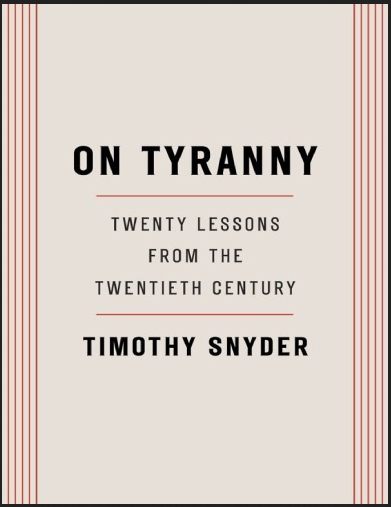
A Review by George Kennedy
I call this 126 page book Snyder to the rescue. Here are some excerpts that should give us pause:
“The European history of the twentieth century shows us that societies can break, democracies can fail, ethics can collapse, and ordinary men can find themselves standing over death pits with guns in their hands. It would serve us well today to understand why.” Death pits could be analogized with the current COVID-19 pandemic. “We might be tempted to think that our democratic heritage automatically protects us…” “Americans today are no wiser than the Europeans who saw democracy yield to fascism, Nazism, or communism in the twentieth century. Our one advantage is that we might learn from their experience. Now is a good time to do so.”
“Do not speak of ‘our institutions’ unless you make them yours by acting on their behalf. Institutions do not protect themselves…So choose an institution you care about—a court, a newspaper, a law, a labor union – and take its side.”
“The mistake is to assume that rulers who came to power through institutions cannot change or destroy those very institutions – even when that is exactly what they have announced that they will do.”
“Human nature is such that American democracy must be defended from Americans who would exploit its freedoms to bring about its end.”
“The symbols of today enable the reality of tomorrow…Life is political, not because the world cares about how you feel, but because the world reacts to what you do. The minor choices we make are themselves a kind of vote, making it more or less likely that free and fair elections will be held in the future.”
“When political leaders set a negative example,” their success is a function of “obedient civil servants, businessmen, judges, and lawyers.” Look at the current line up leadership within the Republican Party. Are they just following orders? What happened to professional ethics?
“When the men with guns who have always claimed to be against the system start wearing uniforms and marching with torches and pictures of a leader, the end is nigh. When the pro-leader paramilitary and the official police and military intermingle, the end has come. The author reminds us that “Without the assistance of regular police forces, and sometimes regular soldiers,” some of Europe’s greatest tragedies could not have achieved the scale they did.
“Avoid pronouncing the phrases everyone else does. Think up your own way of speaking, even if only to convey that thing you think everyone is saying. Make an effort to separate yourself from the internet. Read books. To counter the two-dimensional effect of the visual media, “draw upon a mental armory that we have developed somewhere else. When we repeat the same words and phrases that appear in the daily media, we accept the absence of a larger framework…so get the screens out of your room and surround yourself with books.”
“To abandon facts is to abandon freedom.” “You submit to tyranny when you renounce the difference between what you want to hear and what is actually the case.”
“Figure things out for yourself…Take responsibility for what you communicate with others…It is your ability to discern facts that makes you an individual and our collective trust in common knowledge that makes us a society.”
Be alert to the vocabulary of tyrants who employ words like “extremism” and “terrorism.” “Be alive to the fatal notions of ‘emergency’ and ‘exception.’ Be angry about the treacherous use of patriotic vocabulary. These terms reflect “the essence of fascist governance.” “When tyrants speak of ‘extremism’, they just mean people who are not in the mainstream – as the tyrants themselves are defining that mainstream at that particular moment.”
Understand the real meaning of patriotism. Snyder helps us to understand what patriotism means by outlining in detail what patriotism is not. A patriot “wants the nation live up to its ideas, which means asking us to be our best selves…is concerned with the real world, which is the only place where his country can be loved and sustained…has universal values, standards by which he judges his nation, always wishing it well – and wishing that it would do better.”
All of us are subject to the tug of a political philosophy, an ideology, a set of beliefs, prejudices, and even hatreds. Each of us is also part of a collective that holds the individual accountable for their actions, more so in times of uncertainty, fear, and instability. So how do we anchor ourselves to employ good judgment, make sound decisions, and be true to our best selves? Timothy Snyder’s twenty lessons are a good place to start.
